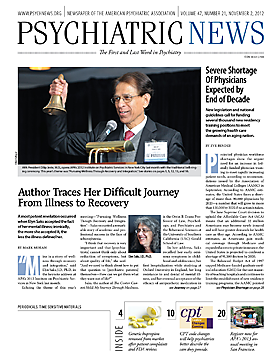FDA Warns of Possible Heart Failure With Mirapex
On September 19, the Food and Drug Administration (FDA) issued a Drug Safety Communication notifying health care professionals about increased risk of heart failure with Mirapex (pramipexole), a dopamine agonist used to treat Parkinson’s disease and moderate-to-severe primary restless legs syndrome. The FDA said results of recent studies suggest a potential increased risk of heart failure requiring further review of available data, but study limitations prevent elimination of other influencing factors. The FDA said it will continue to work with the manufacturer to clarify further the risk of heart failure with Mirapex and will update the public when more information is available.
Until that time, the FDA advised health care professionals to continue to follow the recommendations in the drug label when prescribing Mirapex and advised patients to continue to take their Mirapex as directed and contact their health care professional if they have questions or concerns.
Qsymia Now Available in United States
Vivus announced September 18 the U.S. market availability of Qsymia (phentermine/topira-mate) recently approved by the FDA as an adjunct to a reduced-calorie diet and increased physical activity for chronic weight management in adults with an initial body mass index (BMI) of 30 or greater (obese), or 27 or greater (over-weight) in the presence of at least one weight-related comorbidity, such as hypertension, type 2 diabetes mellitus, or high cholesterol (dyslipidemia).
Vivus is emphasizing the Qsymia Risk Evaluation and Mitigation Strategy (REMS) program, which includes a medication guide, provider training, patient brochure, and other education tools. As part of the REMS program, Qsymia is available only through certified mail-order pharmacies that are part of the Qsymia Home Delivery Network, including CVS and Walgreens.
Approval Sought of Vyvanse as ADHD Maintenance Treatment
Shire announced September 12 that the FDA has accepted its filing for review of a supplemental New Drug Application for Vyvanse (lisdexamfetamine dimesylate) capsules. Shire is seeking approval of Vyvanse as a maintenance treatment in children and adolescents aged 6 to 17 with attention-deficit/hyperactivity disorder (ADHD). There are currently no stimulants approved for maintenance treatment of this age group for ADHD. The application is based on results of a phase 3b, randomized withdrawal, multicenter, extension study (SPD489-326) to evaluate the long-term efficacy and safety of Vyvanse.
Lundbeck Files for European Approval of Vortioxetine
Lundbeck has submitted a marketing authorization application to the European Medicines Agency seeking approval of the investigational multimodal antidepressant vortioxetine (Lu AA21004), which has been accepted for review. The data package supporting the file consists of 10 large, placebo-controlled clinical short- and long-term studies in major depression using dosages from 5 mg to 20 mg of vortioxetine. It includes studies in relapse prevention and in elderly patients with major depression, both of which were presented at APA’s 2012 annual meeting in May. Lundbeck said vortioxetine represents the first European centralized filing of a novel antidepressant treatment since 2007.
The company plans to submit a new drug submission to Health Canada for vortioxetine before the end of this year. Separately, Lundbeck and Takeda, its partner in the United States and Japan, plan to submit a new drug application to the FDA during the fourth quarter of 2012 and in Japan during 2013.
Lundbeck said it plans to present further efficacy and safety data at APA’s next annual meeting, which will be in San Francisco in May.
Presidential Council Reports on Drug Development
The President’s Council of Advisors on Science and Technology submitted to the president in September the report “Propelling Innovation in Drug Discovery, Development, and Evaluation,” in response to President Obama’s request for recommendations. In the report, the council recognizes that “psychiatric diseases remain a tremendous burden on society” and noted that existing treatments have limited efficacy. Citing the estimated cost of Alzheimer’s disease, the council warned of projections that the economic burden of Alzheimer’s disease may ultimately exceed $1 trillion annually if new and effective therapies are not developed.
The council recommended several actions involving industry, academia, and the federal government, including that the United States should set a goal of doubling the output of innovative new medicines that meet critical public-health needs over the next 10 to 15 years. “The continuing development of improved therapeutics is central to advancing public health and is important to our economy. The federal government should exercise strong leadership in ensuring that the nation has a strong ecosystem for drug discovery and development,” the council said.
Alzheimer’s Drug Trials to Continue
Prana Biotechnology reported September 12 that it had received a recommendation from the Data Safety Monitoring Board (DSMB) that the company’s IMAGINE trial for Alzheimer’s disease should continue as planned based on the initial review of clinical data. The DSMB is an independent group of experts who review the accumulated safety data in ongoing clinical trials to safeguard the interests and safety of study participants and future patients. The DSMB considers study-specific data as well as relevant background knowledge about the disease, test agent, or patient population under study.
The IMAGINE trial is a double-blind, placebo-controlled study enrolling 40 patients with prodromal or mild Alzheimer’s disease at five sites in Australia. Brain imaging is being used to measure the effect of
PBT2—a copper/zinc ionophore that rapidly restores cognition in mouse models of Alzheimer’s disease—on amyloid deposits in the brain and effects on increasing brain activity. Cognition effects are being measured by the Neuropsychological Test Battery.

